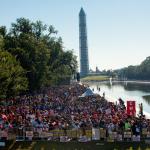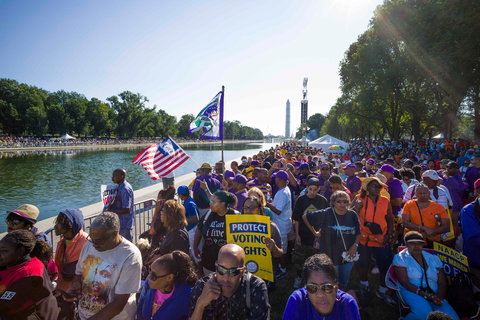Trying to Inspire a New Generation

WASHINGTON — Half a century after the emotional apex of the civil rights movement, Martin Luther King Jr.’s “I Have a Dream” speech, tens of thousands of people retraced his footsteps on Saturday, and his successors in the movement spoke of the still-unmet promise of America, as he did, at the Lincoln Memorial.
The anniversary of the 1963 March on Washington was less a commemoration, speakers proclaimed, than an effort to inject fresh energy into issues of economics and justice that, despite undeniable progress in overcoming racial bias, still leave stubborn gaps between white and black Americans.
The speeches that carried over the Reflecting Pool, which 50 years ago jolted Congress to pass landmark laws, took hard aim at current racial profiling by law enforcement, economic inequality and efforts to restrict voting access.
Addressing generations too young to remember, the Rev. Al Sharpton, an organizer of Saturday’s event, warned young people against the hubris of believing one’s middle class success was achieved alone. “You got there because some unlettered grandmas who never saw the inside of a college campus put their bodies on the line in Alabama and Mississippi and sponsored you up here,” he said.
A lineup of civil rights heroes, current movement leaders, labor leaders and Democratic officials addressed a vast crowd that stretched east from the Lincoln Memorial to the knoll of the Washington Monument — well out of range of loudspeakers. Organizers expected 100,000, fewer than half the number who came in 1963 when efforts to dismantle segregation had seized the national attention, often because of racist violence in the South.
Speakers included Attorney General Eric H. Holder Jr., who on Thursday sued Texas over a strict voter ID law; Representative John Lewis of Georgia, an organizer of the original 1963 march; and Sybrina Fulton, the mother of Trayvon Martin, the Florida teenager who was shot and killed last year.
“I gave blood on the bridge in Selma, Alabama, for the right to vote,” Mr. Lewis said in a deep and sonorous rumble. “I am not going to stand by and let the Supreme Court take the right to vote away from us.”
He and many others called the Voting Rights Act of 1965 a jewel of the civil rights movement that was under attack after the high court struck down the heart of it in June, opening the way for states including Texas and North Carolina to enforce new restrictions on voting access.
Mr. Holder, receiving a roar of welcome from the crowd, said that King’s struggle must continue “until every eligible American has the chance to exercise his or her right to vote unencumbered by discrimination or unneeded procedurals, rules or practices.”
The Martin case, which led to the acquittal of a neighborhood watch volunteer in the killing last month, was also a major touchstone of the day. There were T-shirts with him in a hoodie and the acrid phrase “American Justice,” and signs urging “Support Trayvon’s Law” to repeal stand-your-ground gun measures
“We march because Trayvon Martin has joined Emmett Till in the pantheon of young black martyrs,” said Julian Bond, the social activist who attended the 1963 march.
Mazi Oyo, a 27-year-old marcher from Brooklyn, said the verdict prompted him for the first time to consider how he is perceived as a black man. Even in his diverse and upper-middle-class Park Slope neighborhood, he said, “When I go to the store late at night, I have to dress a certain way.”
Etiah Brookins, 36, a marcher from Queens, said she hoped young people drawn to the march because of Mr. Martin’s death would discover a new connection to the history of the civil rights movement.
Benjamin T. Jealous, president of the N.A.A.C.P., linked the passage in New York City on Thursday of limits to stop-and-frisk police tactics — over the strong objections of Mayor Michael R. Bloomberg — to the Martin case.
The program was far more inclusive than five decades ago, with many women speakers, Latinos and openly gay men and lesbians.
“When women succeed, America succeeds,” said Representative Nancy Pelosi, the House minority leader, who attended the 1963 march. She called for Congress to “make the minimum wage a living wage.”
Every persuasion of liberal politics was represented in the colorfully attired crowd, with many groups in matching T-shirts. Near the entrance to the Mall, people in Robin Hood caps held signs reading “End Racism, Heal America, Tax Wall Street.” A wiry woman energetically sang “This Little Light of Mine” next to people who called sex trafficking modern-day slavery. Others wanted to “ban the bing” — end solitary confinement.
Mr. Sharpton, who as chief organizer and president of the National Action Network gave himself the role of keynote speaker, seized the opportunity to turn up the rhetorical heat. In past decades when blacks voted for Presidents John F. Kennedy, Richard M. Nixon, George W. Bush and others, he said, the IDs they showed at polls sufficed. “Why when we get to Obama do we need some special ID?” he said to a roar of approval.
“When we leave here, we’re going to go to those states” that have passed strict photo ID laws and other restrictions like Texas and North Carolina, he said. “And when they ask us for our voter ID, take out a photo of Medgar Evers” and others “who gave their lives so we could vote,” he said. “ ‘Look at this photo. It gives you the ID of who we are.’ ”

Ozier Muhammad/The New York Times
President Obama, who is scheduled to observe the anniversary in a quieter ceremony on Wednesday at the Lincoln Memorial, and who was mentioned by many speakers as the fulfillment of King’s dream, was perhaps conspicuous by his absence. Through much of his presidency, Mr. Obama has been reluctant to frame issues in specifically racial terms, sometimes to the frustration of civil rights leaders.
Lately he has taken to reminding people that the 1963 demonstration, officially the “March on Washington for Jobs and Freedom,” was as much about fighting for economic equality. He struck the theme on Friday at a town hall-style meeting when he said minorities had made “enormous strides,” but even if all discrimination were ended, “you’d still have a situation in which there are a lot of folks who are poor, and whose families have become dysfunctional, because of a long legacy of poverty.”
His address, at the Lincoln Memorial, will fall on the exact anniversary of the original march, Aug. 28, and he will be joined by Presidents Bill Clinton and Jimmy Carter.
The White House denied he was seeking to avoid sharing a public stage with Mr. Sharpton, a controversial figure, or other civil rights leaders, who on Saturday often portrayed the United States as a country a long way from living up to the promises of its founding fathers.
After the speeches, a procession filed past the Lincoln Memorial to the Martin Luther King Jr. Memorial, then east to the Washington Monument. The route reverses the 1963 procession — when, of course, there was no King Memorial between those of the two monumental presidents.
It was Edwina Love’s second March on Washington. “I was so proud just to be here” 50 years ago, she said. “Overt racism is still prevalent,” said Ms. Love, 77, though she acknowledged great changes. A student in Greensboro, N.C., during the lunch counter sit-ins, she now eats wherever she chooses “without being disturbed,” she said. Ms. Love, who lives outside Washington, hopes the march will galvanize younger generations. “I’m going to talk to my granddaughter,” she said.
Sarah Wheaton, Jada Smith and Ashley Southall contributed reporting.
